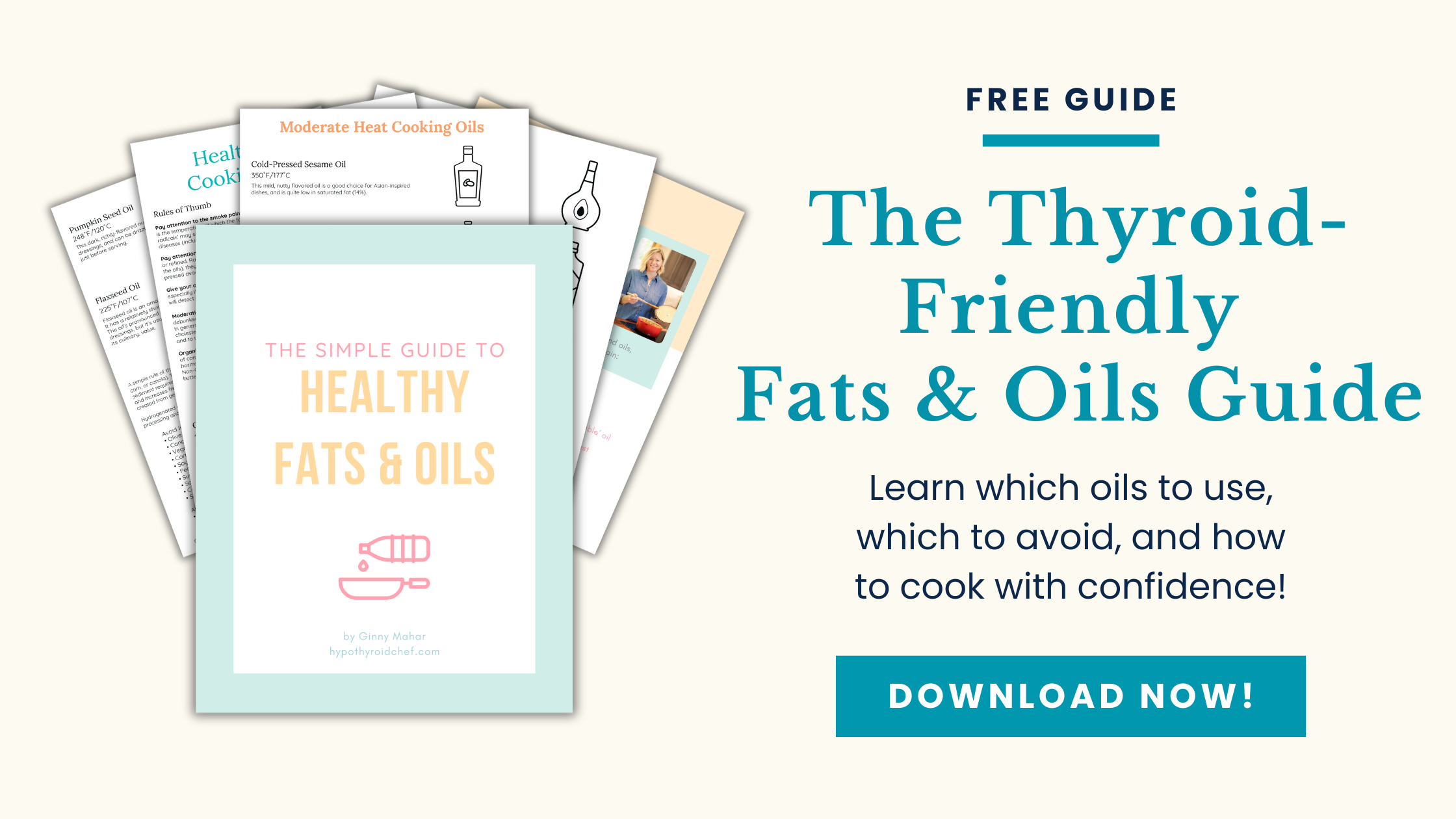The Best Fats & Oils for Thyroid-Friendly Cooking

If you've ever felt confused about which cooking oils are actually healthy, you're not alone. The world of dietary fats is filled with conflicting advice, outdated myths, and misleading marketing.
But the good news? It doesn't have to be complicated.
In today's post, I'm sharing:
- The best cooking oils for thyroid-friendly meals (and how to use them!)
- Which oils to avoid (to protect and support your health)
- My personal pantry staples – the oils I use and trust every day
Consider this post your thyroid-friendly healthy fats cheat sheet—so whether you're roasting, sautéing, or making a salad dressing, you'll know exactly which oils to grab (and which ones to leave on the shelf).
Want a printable cheat sheet?
I've got you covered! Download my FREE Healthy Fats & Oils Guide!
Prefer to watch or listen instead of read?
I break it all down in my YouTube video tour of my favorite healthy fats and my deep-dive podcast episode, The Truth About Healthy Fats: What Thyroid Thrivers Need to Know – Ep. 79.
Take a Video Tour of My Favorite Cooking Oils!
Full disclosure: Some of the links in this post may be affiliate links. As an Amazon Associate, I earn from qualifying purchases. Purchasing a product using one of these links will support my work at no additional cost to you. Thank you for your support!
Podcast Links:
- Listen on the podcast page
- Listen / Subscribe on iTunes
- Listen / Follow on Spotify
- Watch and Subscribe on YouTube
Why Healthy Fats Matter (Especially for Thyroid Thrivers!)
For decades, we were told that fat was the enemy. Low-fat diets were all the rage, and I vividly remember, as an '80s kid, proudly telling my bestie that I had eaten only 1 gram of fat that day—which probably meant I had eaten a whole lot of fat-free bagels, cereal with skim milk, and SnackWell's cookies. Cringe.
Thankfully, we know better now.
Fats are not the enemy. They are essential for hormone production, brain function, and inflammation control—all things that matter when it comes to thyroid health.
The takeaway? It’s not about avoiding fats—it’s about choosing the right ones.
The Science Behind Fats and Thyroid Function
Hormone Support: Your body needs fat to produce hormones (including thyroid hormones).
Nutrient Absorption: Fat helps absorb vitamins A, D, E, and K—crucial for immune and thyroid function.
Brain Health: Your brain is about 60% fat—omega-3s help with focus, memory, and mood stability (issues that many thyroid patients struggle with).
Inflammation Control: Healthy fats calm inflammation, while the wrong ones can fuel it. Since thyroid conditions often involve inflammatory processes, anti-inflammatory eating and choosing anti-inflammatory fats are critical.
The key? Choosing the right fats—because not all fats are created equal, especially when supporting thyroid health.

The Best Cooking Oils for a Thyroid-Friendly Kitchen
Not sure which oil to use for what? Here's a simple breakdown of the best oils for different cooking methods—so you can get the most health benefits (and the best flavor) from your fats.
Best Oils for High-Heat Cooking (Roasting, Searing, Stir-Frying)
These oils are stable at high temperatures and won't break down into harmful compounds:
- Avocado oil – Neutral flavor, high smoke point (~520°F), rich in monounsaturated fats.
- Macadamia oil – Great for stir-fries, adds subtle buttery flavor, higher in monounsaturated fats than olive and avocado oil, and lower in Omega-6s.
- Ghee – A clarified butter that adds rich buttery flavor but with whey and dairy solids removed, low in casein and lactose so tolerated by many who are dairy-intolerant, contains vitamins A and D, best in moderation.
PRO TIP: If you've never tried macadamia oil (and can tolerate tree nuts), this is one worth adding to your pantry collection! Not only does it offer a lovely light and neutral taste with a slight butteriness, it has a high smoke point (~450 F) and is the highest in heart-healthy monounsaturated fats (~80%) and lowest in Omega 6s (~2 - 4%) compared to other healthy oils like extra virgin olive and avocado!
Best Oils for Medium-Heat Cooking (Sautéing, Baking, Light Frying)
- Extra Virgin Olive Oil (EVOO) – Full of antioxidants, perfect for sautéing and everyday cooking
- Organic, Unrefined Coconut Oil – Naturally stable, rich in medium-chain triglycerides (MCTs) for quick energy, and adds a subtle coconut flavor
- Organic, Unrefined Sesame Oil – Great for light sautéing and medium-heat cooking, or in salads and sald dressings. Rich in antioxidants, and adds a delicious nutty flavor. Best used at moderate temperatures or as a finishing oil.
Myth Busting: Many people think olive oil isn’t safe for cooking because of its smoke point, but research shows that Extra Virgin Olive Oil is stable up to 400°F. Thanks to its high antioxidant content, it resists oxidation better than many oils with even higher smoke points.
Best Oils for Low or No-Heat Uses (Salads, Drizzling, Finishing Dishes)
- Walnut oil – Great for salad dressings or drizzling over roasted veggies, contains alpha-linolenic (ALA) omega-3s, which are great for reducing inflammation
- Pumpkin Seed Oil – Deep, nutty flavor, rich in zinc and antioxidants, supports immune and prostate health
- Flaxseed oil – Rich in anti-inflammatory omega-3s, but best for very low or no-heat cooking
Pro Tip: Never buy oils in clear plastic bottles! Light and heat can oxidize oils, making them rancid. Look for dark glass bottles and store oils in a cool, dark place to preserve their beneficial properties.
What to Look For (and Avoid) on the Labels
While some fats fuel health, others can fuel inflammation—which is bad news for thyroid function and those living with thyroid disease. Here are the biggest offenders to watch out for:
- Vegetable oils (soybean, corn, canola) – Typically made from pesticide and herbicide-laden GMO crops that are then highly processed with high heat and toxic chemicals like hexane—a known neurotoxin. Also, these oils are high in omega-6s, which can promote inflammation when consumed in excess of omega-3s. (The Standard American Diet is far too high in Omega 6s.)
- Margarine & Hydrogenated Oils – Trans fats are the worst fats for your health, including your thyroid. They can interfere with thyroid hormone production and signaling, raise your LDL (bad) cholesterol, and increase the risk of heart disease and stroke.
- Refined & Bleached Oils – If a label says "refined, bleached, or deodorized," put it back on the shelf! These oils undergo harsh chemical processing, including bleaching, deodorizing, and high-heat refining, to make them look clear and extend shelf life. Unfortunately, these methods strip away nutrients, introduce harmful residues, and can create inflammation-driving free radicals. And it’s not just soybean, corn, and canola oil—even oils that sound healthy, like olive oil, can be industrially refined. The problem? These oils often aren’t labeled as "refined" or "bleached," making it easy to get fooled by slick marketing.
Look for These Labeling Terms:
To ensure you're getting a truly healthy oil, read labels carefully. Look for terms like:
- Cold-pressed or Expeller-pressed (indicates a mechanical extraction process, not chemical solvents)
- Organic (ensures no GMOs or harmful processing agents)
- Unrefined (retains more nutrients and antioxidants)
- Naturally Refined (some higher-heat oils like avocado or coconut oil may be refined without chemicals, using steam or natural clay filtering)
- Refined Without Toxic Chemicals (for oils that need some processing, like high-heat avocado or coconut oil)
- Extra Virgin (for olive oil and sometimes coconut oil, indicating minimal processing and highest quality)
Being a discerning label reader is key to avoiding hidden chemicals and ensuring you're fueling your body with the best fats for health and thyroid function.
The Science Behind Harmful Oils
- Highly refined vegetable oils are stripped of nutrients and often processed with chemical solvents like hexane. Research shows they can disrupt endocrine function.
- Too many omega-6 fats can contribute to inflammation (and we already get plenty in a standard diet). Studies have linked high ratios of Omega 6 vs Omega 3 fats to increased inflammation, chronic inflammation, and autoimmune disease.
- For Comparison:
- Macadamia Oil: ~3% Omega-6
- Olive oil: ~10% Omega-6
- Avocado oil: ~12% Omega-6
- Canola oil: ~20% Omega-6
- Soybean oil: Over 50% Omega-6
- For Comparison:
- Canola oil and Soybean oil are both goitrogens, meaning they can suppress thyroid function by interfering with iodine uptake, which is particularly concerning for those with existing thyroid conditions. Unlike other goitrogenic foods (broccoli, kale, cabbage, sweet potatoes, and dozens more), the thyroid-inhibiting compounds in canola and soy are NOT destroyed by cooking or fermenting, so these oils are not the best choices for thyroid-friendly cooking.
Want to nerd out with me about cooking fats and oils, and how they differ? Check out my deep-dive podcast episode on thyroid-friendly fats!
My Personal Pantry Staples (And Where to Get Them!)
I keep my kitchen stocked with healthy, high-quality fats that don't interfere with my thyroid or worsen my inflammation. In fact, the choices below are ones I have hand-picked for Thyroid Thrivers because they help lower inflammation, offer various types of healthy fats and nutrients, and support overall health.
- 100% Pure Avocado Oil by Chosen Foods
- Macadamia Nut Oil by Ellyndale/NOW Foods
- Organic Extra Virgin Mediterranean Olive Oil by Spectrum
- Organic Cold-pressed Virgin Coconut Oil by Nutiva
- Himalayan Pink Salt Grass-fed Ghee by 4th & Heart
- Cage-free Duck Fat by Fatworks
- Pasture-raised Leaf Lard by Fatworks
- Organic Unrefined Sesame Oil by Spectrum
- Roasted Walnut Oil by La Tourangelle
- Toasted Pumpkin Seed Oil by La Tourangelle
- Fresh Cold-pressed Flax Oil by Barlean's
You can find all my recommended brands and pantry staples in my Food Faves Storefront—where I've curated the best thyroid-friendly oils and fats I trust and use every day.
Let's Review...
- Fat is not the enemy. It's a nutrient powerhouse with the power to dial down inflammation—when you choose the right kinds, especially for thyroid health.
- Doing a thyroid-healthy makeover of the fats and oils in your pantry can be a powerful way to add health-supporting nutrients and anti-inflammatory goodness to your cooking.
- Learn to read labels and know what terms to look for.
- Avoid trans fats and industrial seed oils when possible to prevent thyroid disruption and avoid toxins.
Resources for Your Thyroid-Friendly Kitchen
- WATCH my YouTube video tour of healthy cooking fats
- LISTEN to my deep-dive podcast episode on healthy fats
- DOWNLOAD my FREE Healthy Fats & Oils Guide
- JOIN my Thrivers Club Community to learn more, get support, and start thriving today!
When you focus on quality fats, you're fueling your energy, hormones, and brain—while making your meals more delicious and supporting your thyroid health journey. I hope the information and resources I've shared with you here can help you do just that!
Wishing you happy cooking, happy thriving, and the best of health!

Ready to Transform Your Kitchen with Thyroid-Friendly Fats?
Get My FREE Healthy Fats & Oils Guide
Feeling overwhelmed by all this information? I've created a comprehensive, printable guide that breaks down everything you need to know about cooking oils for thyroid health.
DOWNLOAD YOUR FREE HEALTHY FATS GUIDE HERE
This easy-to-reference guide includes:
- A complete smoke point chart for all common oils
- Shopping guide with my recommended brands
- Printable pantry inventory sheet
- Quick-reference cooking methods chart
Subscribe to my free newsletter for fresh recipes & lifestyle tips, delivered weekly, and receive a free gift!
By submitting this form, you agree to receive ongoing updates from Hypothyroid Chef











